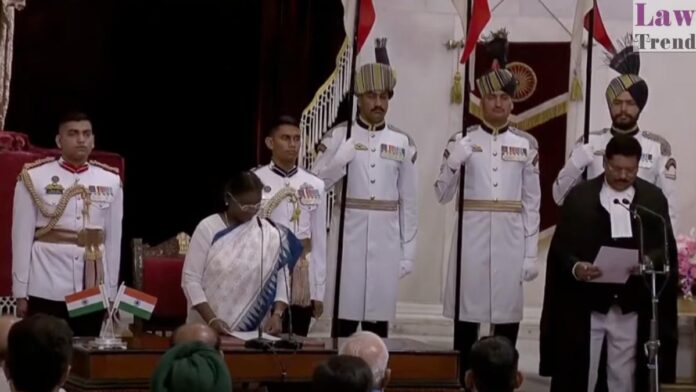New Delhi, May 14, 2025 (Wednesday) — Justice Bhushan Ramkrishna Gavai was sworn in on Wednesday as the 52nd Chief Justice of India, succeeding Justice Sanjiv Khanna who demitted office upon retirement. The oath of office was administered by President Droupadi Murmu during a formal ceremony at Rashtrapati Bhavan.
Justice Gavai takes the helm of the Indian judiciary at a pivotal moment, bringing with him nearly four decades of distinguished legal and judicial experience. His elevation is historically significant, as he becomes only the second Chief Justice of India from the Scheduled Caste community.
A Distinguished Legal Journey
Born on November 24, 1960, in Amravati, Maharashtra, Justice Gavai began his legal career on March 16, 1985. He initially worked under the guidance of the late Shri Raja S. Bhonsale, former Advocate General and Judge of the Bombay High Court, before starting independent practice at the Bombay High Court in 1987. He later concentrated his practice at the Nagpur Bench, handling matters primarily in Constitutional and Administrative Law.
Over the years, he represented several key institutions including the Municipal Corporations of Nagpur and Amravati, Amravati University, and public sector undertakings such as SICOM and DCVL. His public service included tenures as Assistant Government Pleader and Additional Public Prosecutor (1992–1993), and later as Government Pleader and Public Prosecutor at the Nagpur Bench starting January 17, 2000.
Judicial Career
Justice Gavai was elevated as an Additional Judge of the Bombay High Court on November 14, 2003, and became a Permanent Judge on November 12, 2005. During his tenure at the High Court, he served at multiple benches including Mumbai, Nagpur, Aurangabad, and Panaji.
On May 24, 2019, he was appointed as a judge of the Supreme Court of India. In his six years at the apex court, Justice Gavai has been part of more than 700 benches and has authored close to 300 judgments, covering a wide array of legal fields — from constitutional and administrative law to civil, criminal, commercial, environmental, and education-related matters. He has also contributed to several Constitution Bench decisions.
His rulings have been commended for strengthening the rule of law and upholding the fundamental, human, and legal rights of citizens.
International Engagement and Academic Contributions
Justice Gavai has actively represented the Indian judiciary at international legal forums in Ulaanbaatar (Mongolia), New York (USA), Cardiff (UK), and Nairobi (Kenya). He has also addressed academic audiences at globally renowned institutions such as Columbia University and Harvard University, particularly on issues concerning constitutional and environmental law.
As Chief Justice, Justice Gavai is expected to bring his deep understanding of constitutional values and judicial administration to the forefront. His tenure, though relatively short—set to end on November 23, 2025—will be closely watched for its impact on both legal reform and institutional integrity within the Indian judiciary.




